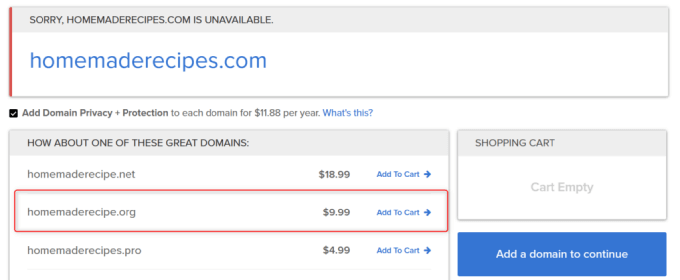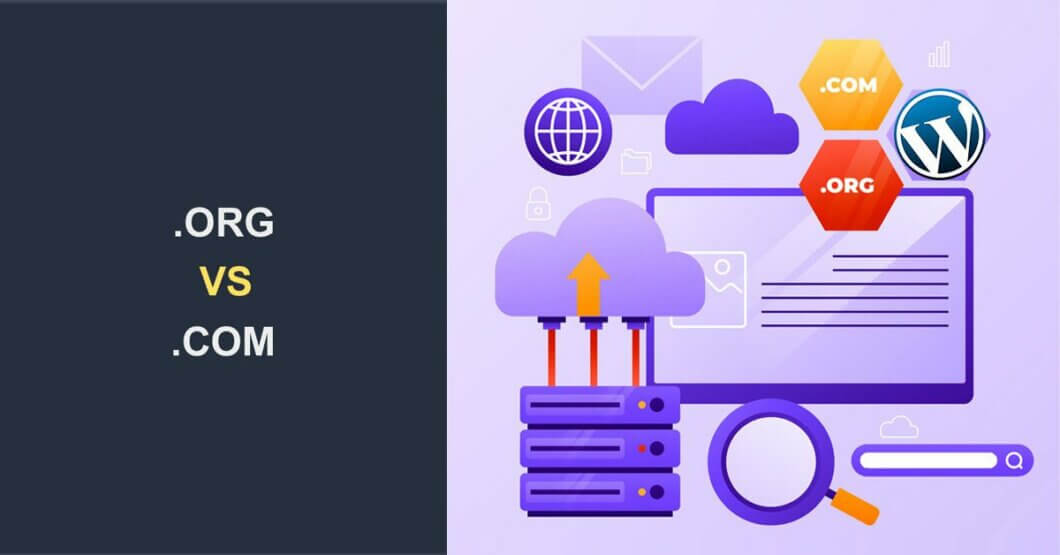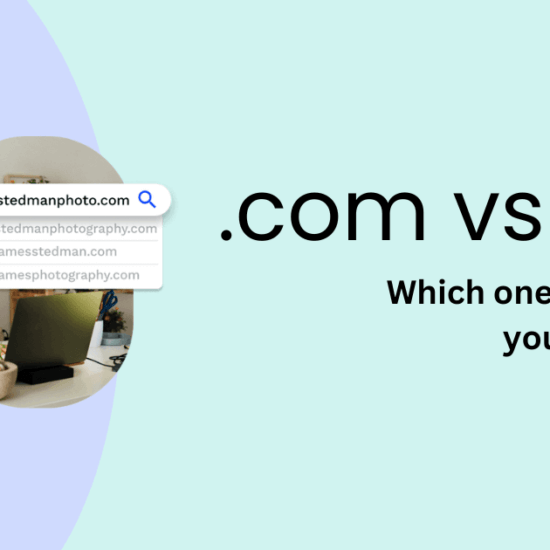Ever found yourself stuck in the .Org vs .Com dilemma when choosing a domain extension?
Well, you’re not alone! Selecting the right domain extension is crucial for how your brand is perceived and the ease with which users discover your site.
In this blog post, I’m diving deep into the .org vs .com debate, shedding light on the nuances that often go unnoticed.
As someone who’s been there and done that, I understand the importance of making an informed decision.
So, let’s explore these popular domain extensions together and figure out which one suits your needs best.
Whether you’re a seasoned website owner or just starting out, join me on this journey to demystify the world of domain extensions.
By the end of this read, you’ll be equipped with the knowledge to confidently choose between .org and .com, ensuring your online presence aligns perfectly with your goals.
Let’s navigate the .org and .com landscape and make a decision that not only resonates with your brand but also boosts your site’s visibility.
Ready to dive in?
Let’s get started!
What are Domain Extensions, and Why Should You Care?
Alright, let’s break it down in simple terms!
So, a domain extension is like the last part of a web address, you know, the stuff that comes after the dot. Think of it as the finishing touch to your website’s name.
For example, check out AnukulSaini—I went for .com. On the other hand, websites like WordPress go for .org. But wait, there’s a twist!
There’s a .com for WordPress too, but that one is a product you buy, not the free, open-source version.
Now, how does this whole web address thing work? Well, there’s this techy system called the Domain Name System (DNS).
When you type in a website like anukulsaini.com, the DNS goes on a little mission. It looks up that name and finds the real home of the website, kind of like a numerical address where it lives.
Why don’t we just use those numbers instead of names? Because names are way easier for us humans and search engines to remember.
And guess what? The dot-whatever part (the domain extension) isn’t just for show—it actually says something about what the website is about.
For example, .com is like the go-to for businesses, while .org is more for non-profit groups.
Imagine this: when people see your website address, they might guess what your thing is about based on that little dot and what comes after it.
So, let’s talk about the difference between a .org and .com. Which one suits your website vibe better?
What is a .org Domain Extension?
In order to provide valuable information, nonprofit organizations and charities were given the.org extension, which stands for organization.
Most of the time,.org websites are used to get people to know about an event, accept online payments, and look for volunteers. Visitors therefore know what to expect when they see a.org domain name.
Even if the website is not run by a nonprofit organization, anyone can register it with the.org domain extension.
But.org domains can still be useful for businesses if they are linked to their charity arm. Other domain names, on the other hand, help protect the brand.
What is a .com Domain Extension?
Commercial companies use the .com extension because it is the most popular domain extension.
For general-purpose websites, whether or not they have commercial intent,.com is now the standard domain extension.
Because of this, the idea that .org is only for nonprofits has stuck around a lot longer than the idea that.com is only for companies.
Differences Between .org and .com
Now, let’s chat about the nitty-gritty differences between .org and .com. So, even though they don’t have special rules for joining their club, there are some big distinctions.
Availability
First up, the availability game. .com is like the popular kid at school—it’s everywhere. So, snagging the perfect .com name can be a bit like searching for a needle in a haystack.
Lots of the good ones are either taken or someone’s camping on them, just waiting.

But fear not! If the .com scene is too crowded, you might want to explore other options. Cue the .org gang.
There are way fewer .org websites out there, like way fewer—161.1 million .coms versus only 10.6 million .orgs. It’s like having more elbow room in a less crowded party.
And guess what?
Because .org is the quieter sibling, it’s also lighter on the wallet. Yep, it’s usually cheaper to get a .org domain than a .com one. The .com crew is in high demand, so prices can be a bit steep.
So, if you’re on the hunt for the perfect web address and the .com party is too packed, consider swinging by the .org gathering. You might just find the hidden gem you’re looking for, without breaking the bank.

Credibility and Trustworthiness
The .org extension still inspires a lot of trust because it was made for nonprofit organizations and is still used by many of the biggest charities and charitable groups. It gives a site more authority than the .com extension when used on the right page.
Still, it relies on what your site is meant to do. Most visitors might be perplexed by your domain extension if you launch an online store using a .org TLD because they might think they’re visiting a nonprofit website.
This can make a lot of people leave your site quickly, which is bad for your SEO.
If you run a nonprofit organization with a mission, your website should reflect that.
Because of its familiarity, the .com extension continues to be a more recognized domain than other TLDs.
People are 33% more likely to remember .com names, and when they try to remember a URL, they’re 3.8 times more likely to think it ends in.com.
It’s also important to remember that there are other things that show how trustworthy a site is. A site that is using HTTPS, for example, has active SSL security, which is safer for users and their data.
Traffic
If all you want is to brand yourself and be easy to find, .com is the best option. The extension.com is the most normal one for visitors to type in if you want them to find you.
That’s why the.com domain extension is used for WPBeginner and all of our other apps.
Only 5% of websites use.org, while 48% use .com. People think of.com as the standard extension. And because of this, people are more likely to remember a .com domain, which can lead to more direct business.
Of course, .org domains are likely to rank better for keywords related to nonprofit organizations.
But some mobile devices have a.com button on their keyboards, which also makes them a better choice for mobile users. People can press and keep the .com button to see other extensions, such as .org.
When Should You Use a .org Extension?
Wondering when to use .org for your website?
Here are some prime times to hit the switch:
- Charity and Nonprofit Heroes: If you’re in the business of doing good, a .org extension is like a superhero cape for your website. People have this cool habit of linking .org with charities and nonprofits. So, if you’re out there making the world a better place, this extension shouts, “Hey, we’re here to serve others!”
- Open-Source Champions: Even if you’re not a nonprofit, but you’re into open-source vibes, .org is your go-to badge. It’s like the universal symbol for “Hey, our stuff is free for all!” Take WordPress.org, for example. They’re all about sharing the website love without charging a dime.
- Info Buffs and Knowledge Dabblers: If your website is a treasure trove of unbiased info, a .org is your trusty sidekick. People know .org sites are like the wise elders of the internet, dishing out valuable, no-nonsense information. So, if you’re in the business of helping people learn about important stuff, .org is your virtual high-five.
Remember, while anyone can rock a .org, these scenarios are where it shines the brightest. So, if your website falls into the world-changing, open-handed, or info-packed categories, consider .org your online BFF.
When Should You Use a .com Extension?
Choosing the most suitable domain extension primarily hinges on the nature of your website.
Here’s a brief guide emphasising the use of .com:
- Business Websites: Opt for .com as it enjoys broad appeal and is a standard choice for commercial ventures. Whether it’s a large corporation, small business, or startup, .com is widely accepted and considered appropriate for most for-profit enterprises.
- Ecommerce Stores: Selecting .com is advantageous for ecommerce platforms. Its widespread use and established reputation contribute to user confidence. Shoppers are more likely to trust and make purchases on an online store with a .com extension compared to alternatives like .xyz or .biz.
- Blogs and Personal Brands: For blogs and personal brands, .com is an excellent choice due to its simplicity and ease of remembrance. This extension enhances your brand’s memorability and appeal, facilitating a broader reach to your target audience.
Which Extension is Better .Org Vs .Com?
When establishing a small business, opting for a .com domain is a solid choice. This extension generally outperforms others in terms of SEO, contributing to a more robust online presence.
It is considered the default and go-to choice for a variety of online entities, including businesses, personal websites, publications, and blogs.
However, the drawback lies in the availability of desired .com URLs due to the vast number of existing websites. This may prompt consideration of alternatives. Assessing the value of altering your brand name or appending additional words to secure the .com extension is essential.
In cases where a .com is unavailable or not preferred, alternatives like .org or .net can be considered. Utilizing domain name generators or platforms like Nameboy is recommended to aid in finding a suitable URL for your business.
The perception of your brand and website traffic can be influenced by the choice of a .com domain, making it advisable to seek one that aligns with your business.
While other top-level domains (TLDs) like .edu, .biz, .gov, and .net exist, .com is often deemed optimal for new website owners.
For multilingual or region-specific websites, choosing the appropriate country code, such as .co.uk or .ca, is crucial.
In essence, the decision rests with you, but for most new website owners, .com remains the preferred choice.
I trust that this article has provided you with insights into the distinctions between .org and .com domain name extensions.



